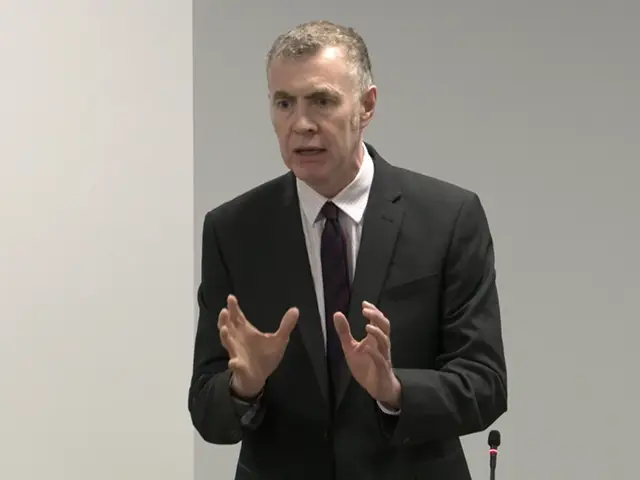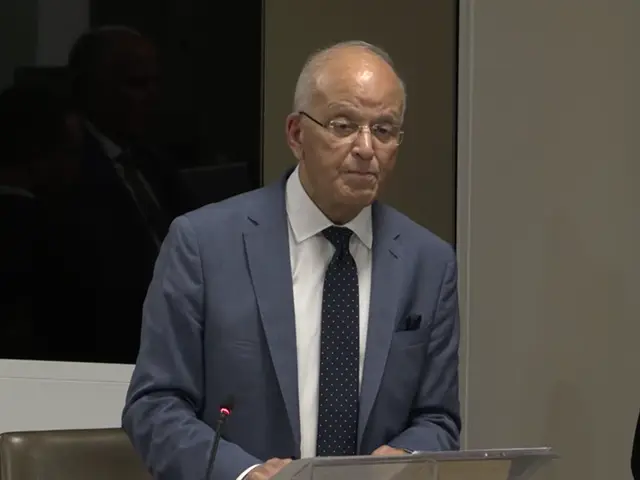Politics
Boost for games development sector
Cardiff has announced funding support for the next two years to maintain the momentum of the Wales Games development show, a national and international showcase to promote Welsh talent and expertise in the sector.
Economy Minister Edwina Hart said funding support will ensure the show will remain a key, stand alone, annual event in the UK Games calendar and will build on its successes to date. _ e Minister said: “_ e Welsh Government is committed to developing the Welsh games sector which is a rapidly growing, high pro_ le, high value element of the creative industries. We have considerable talent in Wales which is fostered by our further and higher education institutions and have a growing cluster of highly successful companies working in a very competitive global market.”
Climate
Pembroke tidal flood defence work to continue to January

SIGNIFICANT issues with a part of Pembroke’s tidal barrage are not expected to be fully fixed before late January, councillors heard.
Pembroke councillors Aaron Carey and Jonathan Grimes submitted an urgent question heard at the December meeting of Pembrokeshire County Council, which said: “In light of the repeated flooding events across the county – including the recent overflow at Castle Pond and the acknowledgement by your own Coastal, Rivers & Drainage Team that the barrage tipping gate remains inoperable until mid-January can you explain what assessment has been made of the adequacy of our tidal outfall infrastructure in the face of current and projected future storm surges and sea-level rise?
“If no such assessment has yet been undertaken, will you commit now to commissioning an immediate structural and risk-capacity audit, with a report to full council within three months, and with proposals for funding any remedial works required — to avoid recurring damage and disruption to residents, highways, and public amenities?”
Responding to the urgent question, Cabinet Member for Residents Services Cllr Rhys Sinnett said a significant assessment of the Pembroke Tidal Barrage had already been undertaken over the past two years, with regular inspections.
He said “a comprehensive package of works” began in September which were due to be completed before Christmas but said there had been “significant issues” with the tipping gate hydraulic ram, with a significant overhaul now taking place, with reinstatement expected by late January.
He told members additional mitigation measures were now in place and, once works are completed, enhanced works will provide improved resilience and “long-term reliability,” with further reports due to come to Cabinet.
Cllr Carey and Cllr Grimes had also submitted a notice of motion saying: “That this council notes with concern the repeated and increasingly severe flooding experienced in our coastal, estuarial and river-fringe communities over recent weeks — in particular the flooding events affecting the Commons/Castle Pond area.
“That the council further notes that, according to correspondence from the Coastal, Rivers & Drainage Team Manager, the tipping gate at the barrage remains out of operation until mid-January due to mechanical issues; meanwhile high tide, heavy rain, wind-driven tidal surges and overspill at the sluice have combined to overwhelm the drainage/outfall infrastructure.
“That we recognise the current maintenance schedule (delayed ‘til after the summer season) and the justification given — but further that such planning failed to foresee the likelihood of severe winter storm and surge events, which climate change makes more frequent and more intense.
“That this council therefore calls on the Cabinet to commission an urgent review of:
- The adequacy of the current drainage/outfall and tidal-sluice infrastructure (barrage tipping gate, sluice/sluice-valve, flap valve, outfall capacity) for current and projected climate/tide conditions.
- The maintenance scheduling policy for coastal and estuarial flood-risk assets, with a view to ensuring critical maintenance is completed before winter high-tide / storm-surge season, rather than — as at present — being delayed until after summer for ‘recreational / biodiversity’ reasons.
“That, pending the outcome of the review, the council should allocate appropriate emergency capital funding to remediate the barrages / sluices / outfalls at risk of failure or blockage — to safeguard residents, properties, highways and public amenities from further flooding.
“That, further, this council resolves to publish a public flood-resilience plan for the county, identifying all coastal and river-fringe ‘hotspots,’ maintenance schedules, responsible teams, and a transparent timeline for upgrades or remedial works — so residents have clarity and confidence in flood prevention measures.”
The notice of motion itself will be considered by the council’s Cabinet at a later date.
News
UK government boosts Port Talbot transition fund with extra £22m support

AN EXTRA £22 million in UK Government funding has been announced to support workers and businesses affected by Tata Steel’s transition at Port Talbot, taking the total community support package to £122 million.
The funding uplift means the Tata Steel / Port Talbot Transition Board fund now stands at £102 million from the UK Government, alongside a further £20 million contributed by Tata Steel. Ministers say the additional money could help support up to 1,000 more jobs across the local economy.
Since July 2024, the Transition Board has already allocated £80 million to the Port Talbot area, funding thousands of training courses for individuals and helping nearly 200 businesses to start, expand, invest in new equipment and move into new markets.
The UK Government said the rapid deployment of the funding has helped prevent an increase in unemployment benefit claims during Tata Steel’s shift towards greener steelmaking.
Following strong demand for support, a further £22 million has now been allocated, extending the availability of Supply Chain, Business Start-Up, Resilience and Growth funding into 2026. The announcement was made on Thursday (Dec 18).
Secretary of State for Wales Jo Stevens said the government was determined to continue backing the community through the transition.
She said: “This government has acted decisively to support workers and businesses in Port Talbot, allocating the entire £80 million in initial funding quickly into the community to ensure that whoever needed support could access it.
“Grants have been delivered swiftly to meet the needs of local people, businesses and communities, and there is evidence that our approach is working. But we want to make sure that as many people as possible have continued access to support with the extra £22 million for local businesses into the new year.
“We said we would back workers and businesses affected by the transition at Port Talbot and are delivering on that promise.
“It remains a difficult time for Tata Steel workers, their families and the community, but we will continue to support them.”
Ms Stevens announced the funding increase during a visit to Port Talbot-based engineering firm JES Group, which has received Transition Board support. She also toured the JES Academy, which is providing training for dozens of former and current steelworkers.
Justin Johnson, Director of JES Group and The Skills Academy, welcomed the announcement.
He said: “I want to express our gratitude to the UK Government for establishing the original Transition Fund and for now having the foresight to increase the level of support at such a critical moment.
“This uplift will make a significant difference to supply-chain companies like ours. As Tata Steel transitions to electric arc furnace steelmaking, businesses like JES must transition alongside it, while also diversifying into new sectors to reduce reliance on what was once our core work.
“We believe the history of steelmaking in Port Talbot is far from over and that a brighter, greener future lies ahead, but while that future takes shape, diversification is essential.
“The journey has not been easy, and it is far from over, but this additional support creates real opportunities for stability and growth. I also want to recognise Business Wales and Neath Port Talbot Council’s economic development team for their guidance and practical assistance.”
The Transition Board was established to protect jobs and the local economy during Tata Steel’s move to greener steel production. Information on applying for support is available via the Tata Steel Transition Information Hub.
The UK Government has also committed £2.5 billion to rebuild and decarbonise the UK steel industry, with a national Steel Strategy due to be published in early 2026. This includes £500 million already allocated to Tata Steel for the electric arc furnace now under construction at Port Talbot.
Politics
Debate over single Welsh police force reignited amid merger reports

THE PROSPECT of merging Wales’ four police forces into a single mega-force has resurfaced, as politicians scrambled to respond to reports of an overhaul of policing in the new year.
Adam Price raised reports that Home Secretary Shabana Mahmood is considering cutting the number of police forces in Wales and England from 43 to 12 through mergers.
The former Plaid Cymru leader told Senedd members the reforms would represent the “biggest upheaval” of police forces since the 1960s.
Warning the Welsh Government was not consulted on plans to scrap police and crime commissioners, he said: “No change should happen – a merger for example – without full Senedd scrutiny and a Welsh democratic mandate.”
Mr Price suggested an all-Wales model – merging the four police forces, similar to what happened in Scotland in 2013 – could have benefits but said governance would be critical.
During topical questions on Wednesday December 17, he argued a single police force would need to be accountable to the Senedd, with powers over policing devolved to Wales.
The MP-turned-Senedd member urged the UK Government to rule out any cross-border mergers involving a Welsh force being absorbed into an English one.
Responding for the Welsh Government, Jane Hutt described the widespread media reports as “unhelpful, unconfirmed speculation”. But she confirmed the UK Government is expected to publish a white paper in the new year.

She committed to engaging with Sarah Jones, the UK policing minister, who was attending a meeting of the Welsh policing partnership board the next day (December 18).
Ms Hutt told the Senedd she has been assured the UK Government recognises the differing governance arrangements between Wales and England.
Conservative Altaf Hussain urged the Welsh Government to take the opportunity to abandon calls for devolving powers over policing and justice to Wales.

Dr Hussain said: “There is merit in having a single unified police force for England and Wales – if only to tackle dysfunctional forces like Gwent Police, who have allowed a culture of misogyny to persist amongst their officers and leaders.”
Ms Hutt suggested reforms would present a natural opportunity to consider the role of the Welsh Government and Senedd in terms of accountability for policing in Wales. She said the focus is on a phased approach, beginning with powers over youth justice and probation.
Jane Dodds, the Liberal Democrats’ leader in Wales, called for a clear timetable for the devolution of youth justice and probation. “We need more devolved powers,” she said.
Labour’s Alun Davies agreed, accusing UK ministers of putting Ms Hutt in an “invidious position” of responding to hearsay about a fundamental public service. He said: “This is the second time in two months… this simply isn’t good enough.”

Mr Davies criticised Labour colleagues in the UK Government for “clearly” not recognising calls for policing to be devolved and biting the bullet. “That needs to happen,” he said, adding: “It needs to happen as soon as possible.”
The former minister told the Senedd: “We certainly don’t want to see the nationalisation of policing that’s just been proposed by the Conservatives. We’ve never had a national police force in the UK – we don’t want one today.”
It was “groundhog day” for the Conservatives’ Mark Isherwood who reminded the chamber of the then-Assembly’s review of policing in 2005 when mergers were floated previously.
He said: “To recognise the regional cultural and geographical differences that exist within Wales, all agreed that Wales must be policed in regions.”
But Rhys ab Owen, who sits as an independent, argued Wales’ four police forces “make no sense at all” with Police Scotland showing a unified force can “flourish”.
-

 Crime16 hours ago
Crime16 hours agoMilford Haven man jailed after drunken attack on partner and police officers
-

 News4 days ago
News4 days agoDyfed-Powys Police launch major investigation after triple fatal crash
-

 Crime3 days ago
Crime3 days agoMan sent to Crown Court over historic indecent assault allegations
-

 Crime2 days ago
Crime2 days agoMan charged with months of coercive control and assaults
-

 Crime4 days ago
Crime4 days agoMan spared jail after baseball bat incident in Milford Haven
-

 Crime14 hours ago
Crime14 hours agoTeenager charged following rape allegation at Saundersfoot nightclub
-

 Crime2 days ago
Crime2 days agoMilford Haven man admits multiple offences after A477 incident
-

 Education7 days ago
Education7 days agoTeaching assistant struck off after asking pupil for photos of her body






















